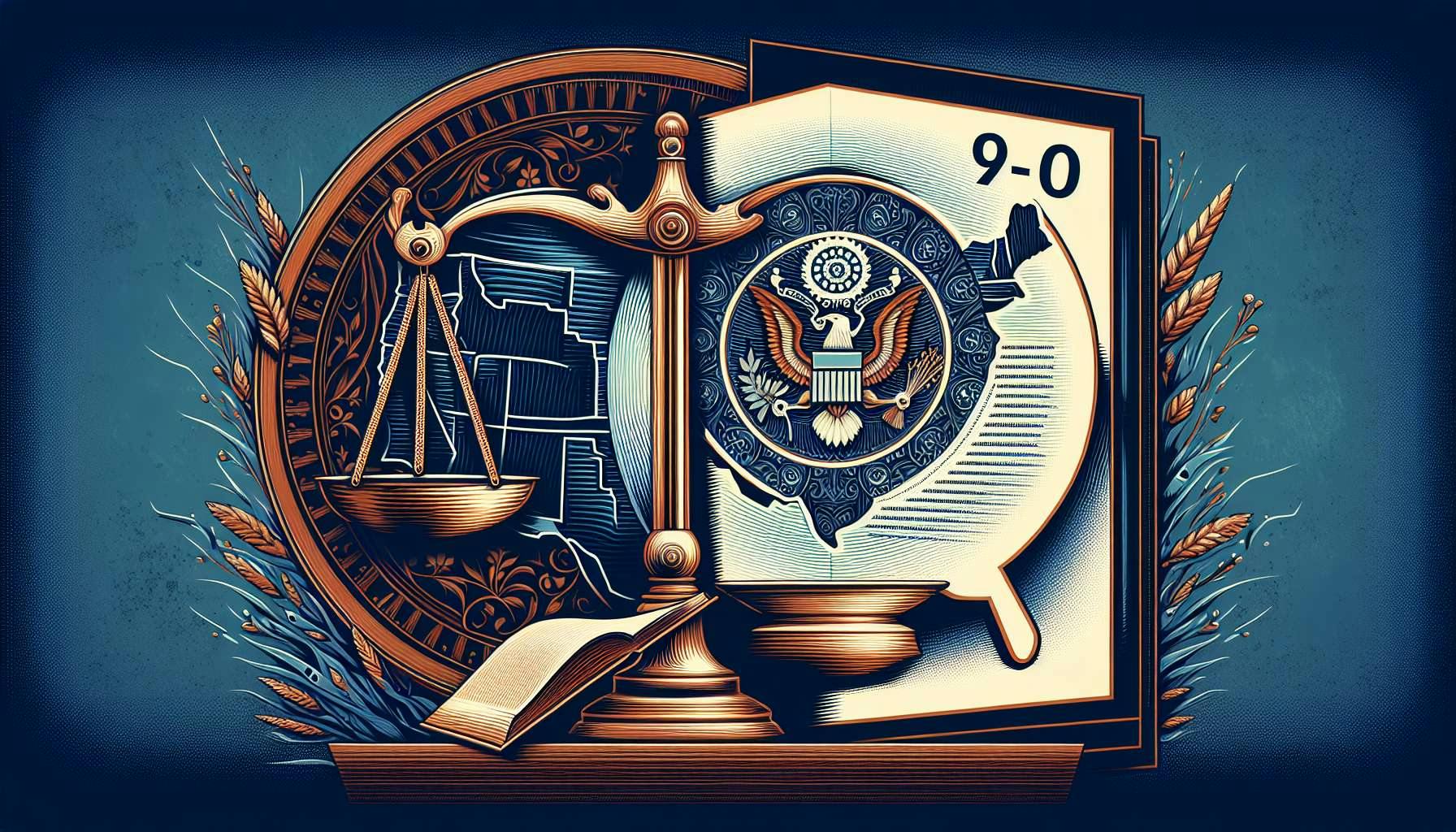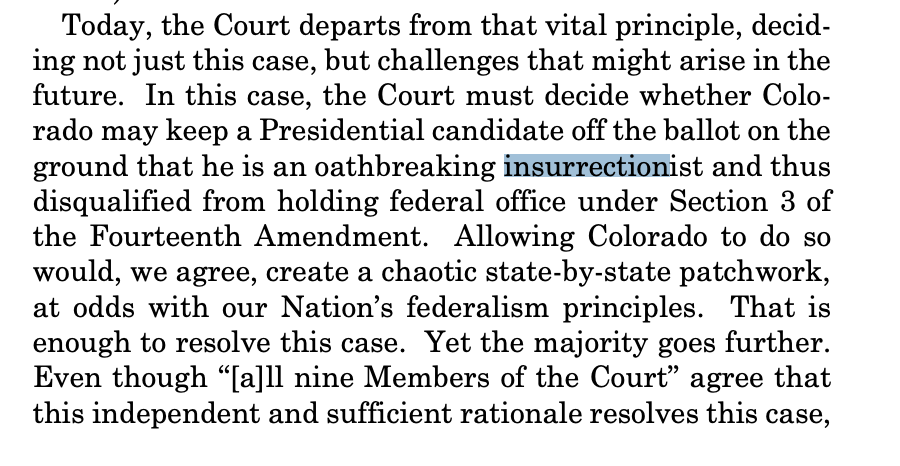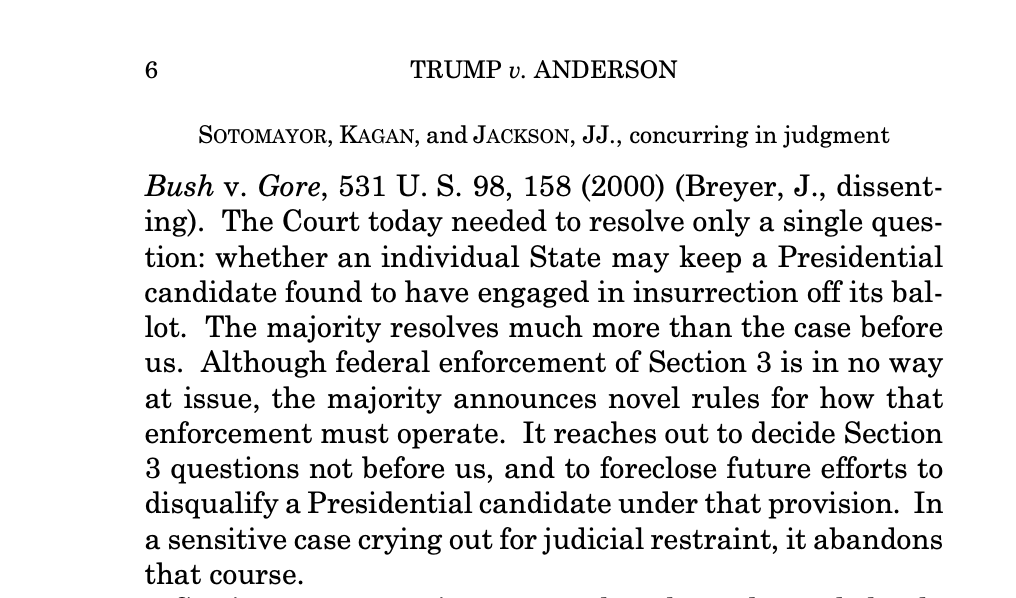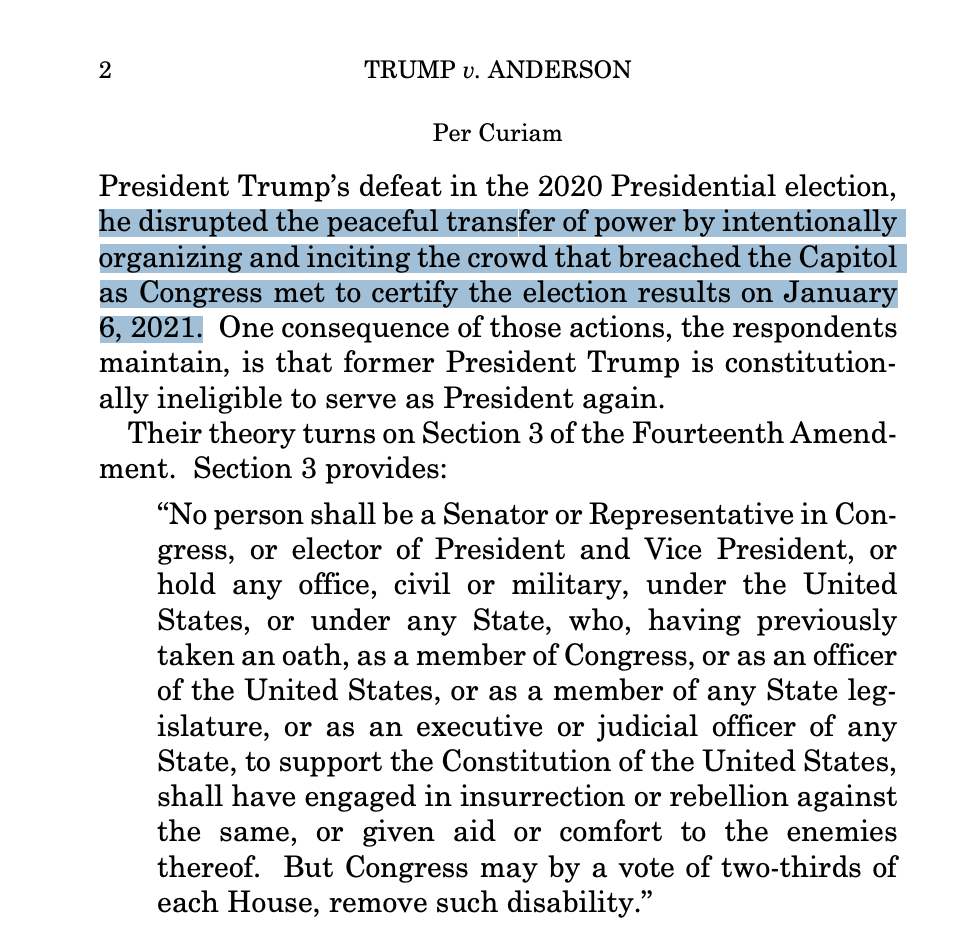
Ex-White House lawyer says Supreme Court could rule ‘9-0’ in possible Trump 14th Amendment case
Resolves YES if the US Supreme Court rules 9-0 that Trump is eligible to appear on the ballot in Colorado for the US 2024 Presidential election, otherwise NO.
🏅 Top traders
| # | Trader | Total profit |
|---|---|---|
| 1 | Ṁ2,325 | |
| 2 | Ṁ1,241 | |
| 3 | Ṁ889 | |
| 4 | Ṁ565 | |
| 5 | Ṁ525 |
@SemioticRivalry From my understanding, the legal arguments were actually pretty good in favor of state courts being able to decide qualification of candidates. The US is very weird in that it gives the states the vast majority of the power in how to run federal elections. And the rulings in the state courts were on very solid legal footing, as far as I understand.
But the outcome was pretty much certain due to practical reasons, but it wasn't clear whether it would be unanimous - it looked like there could be 1 dissent based on oral arguments.
@jack I respectfully and slightly disagree having listened to oral arguments and paid very closely to this.
I was on the other side of this market and lost a lot of mana in total, but after having listened to the oral arguments it became clear that it would be unanimous based upon the lines of questioning, and I switched sides.
While the US does give states the vast majority of power in how to run federal elections, since the thirteen colonies were originally independent sovereign nation states which bound together, and each state admitted afterward is considered a sovereign state. However during the oral arguments it became clear that there are exceptions to sovereign rights, and this is one of them, both the so-called liberal and conservative justices agreed upon that.
The practicality seems to come in on the treatment and emphasis on, "should this be treated an insurrection?" The concurring opinion wrote that the majority did not put enough emphasis on the question being about whether there was an insurrection or not. The majority opinion didn't dispute that there was an insurrection on January 6th, 2021, they just said, "well this is what the lower court found, moving on."
@PatrickDelaney The practicality wasn't about whether it was insurrection, and I think it's completely intentional that they skipped over that in the opinion. The practical consideration was whether to disqualify the guy who's going to win the Republican nomination for president. It was pretty clear that SCOTUS was not going to agree to that. But before oral arguments, there was a ton of uncertainty about whether some would dissent. After oral arguments, I agree it the picture moved significantly towards 9-0, and we do see that in the graph here - perhaps 50% was too low at that point, I'm not super sure.
@jack From the first page:

from the last page:

The concurring opinion mentions the word, "insurrection" or "insurrectionist" 12 times. They were saying that 1/6 was an insurrection. This constitutes text in a concurring decision which talks about insurrection (regardless of whether or not this was the only thing talked about).
The Majority decision does mention insurrection as well, 6 times, but mostly as a demonstrative artifact to basically say, "yeah, here's what the SCOCO found, we're not questioning that, we're questioning State Enforcement of a Constitutional Rule."
As to whether this had to do with the events of January 6th, 2021, as opposed to the sum total of all events over time, the majority DOES specifically mention January 6th, 2021 on page 2, in terms of its relevance toward the question:

None of the opinion mentions the idea that Trump is going to or might win the Republican nomination, this was not taken into consideration in the written opinion, so it's not a ruling. The opinion does talk about how Trump is a presidential candidate, and talks about presidential candidates in general with respect to the question...it tries to generalize things.
Where is the idea that Trump is highly likely to win the Republican nomination influencing the decision coming from? Was that in the oral argument somewhere and I missed it? Or is that more like, media chatter? Or something else..?
@PatrickDelaney It wasn't expressed in the legal opinion. It was what I, and every analysis/opinion article on the subject I've read, surmises was the key reason behind the scenes, in the justice's heads.
Basically, the claim is that SCOTUS knew the decision they wanted to arrive at. The question was which legal argument they would decide to use to come to that decision.
And this is what the forecasters were also going off of - this is why we priced SCOTUS overturning at like 90%.
E.g. https://adamunikowsky.substack.com/p/is-the-supreme-court-seriously-going-40f summarizes it as:
The conventional wisdom is that the Supreme Court will reverse the Colorado Supreme Court and find that Trump is eligible for the presidency. This wisdom is conventional for three reasons:
Normative take: It would be insanely anti-democratic—the very peak of judicial activism—to disenfranchise millions of voters who support Trump. The voters, not federal judges, should decide whether Trump’s actions on January 6 are disqualifying.
Descriptive take: There are six Republican appointees on the Supreme Court, including three Trump appointees, and it is unlikely Republican appointees would disenfranchise Republican voters.
Lawyerly take: Trump has many legal arguments against disqualification, each of which is independently sufficient for him to prevail. The proponents of disqualification have to win on all of these arguments in order to win the case. Even if Trump’s arguments are individually weak, it will still be hard for the proponents of disqualification to pull a clean sweep.
And it goes on to say about point 3:
the arguments for outright reversal, while high in number, are all quite bad. Trump has some good arguments that Colorado’s procedures were flawed, but his arguments that he is eligible for the presidency as a matter of law are weaker. As to the latter set of issues, the Colorado Supreme Court’s decision is very well done, and it will not be easy to reverse.
The concurring opinion mentions the word, "insurrection" or "insurrectionist" 12 times. They were saying that 1/6 was an insurrection. This constitutes text in a concurring decision which talks about insurrection (regardless of whether or not this was the only thing talked about).
You may have misunderstood me. When I said "skipped over" I didn't mean "totally skipped over", I just meant I agreed with you on them not really debating it much:
The majority opinion didn't dispute that there was an insurrection on January 6th, 2021, they just said, "well this is what the lower court found, moving on."
@jack Here is something specific in the ruling which I think supports your notion of “practicality,” somewhat, from Barrett…
this is not the time to amplify disagreement with stridency. The Court has settled a politically charged issue in the volatile season of a Presidential election. Particularly in this circumstance, writings on the Court should turn the national temperature down, not up.
Funny because just being silent to the response would probably have highlighted it less. Evidently it’s rare to criticize tone according to scotusblog.
Oh and of course the other big practical reason was that, practically speaking, it would be pretty dumb for different states to decide whether a candidate was eligible differently. That's not like stated in the law anywhere explicitly, and election law does indeed include many dumb things. But our courts do take into account practicalities.
Allowing states to enforce Section 3 for federal candidates could result in a scenario in which “a single candidate would be declared ineligible in some States, but not others, based on the same conduct (and perhaps even the same factual record),” the court warned. And that could create a “patchwork” that could “dramatically change the behavior of voters, parties, and States across the country, in different ways and at different times.” “Nothing in the Constitution,” the court wrote, “requires that we endure such chaos.”
@jack Yeah, well...there's political practicality, and then there's court/law practicality. The previous comments I think we made above had to do with political practicality, right? Whereas what you are saying has to do with the actual ruling, and yes, absolutely I agree that's what the ruling was about, practicality on a historic scale. Yeah this was my main oversight in this market. I had knee-jerk voted away from 9-0 when I heard political pundits on the Trump side saying this was going to go 9-0...I typically just think anything any political pundit says is not predictive. But yes, it would have been a disastrous ruling, Republican States would have been blocking Biden, Democrat States blocking Trump, and then that would be how every election would be through the rest of our lives going forward.
On the other hand, maybe that would force parties to choose candidates that appeal to all of the States, rather than populist candidates...? I really don't know.
https://www.supremecourt.gov/opinions/23pdf/23-719_19m2.pdf
All nine Members of the Court agree with that result.
Per Curiam does not mean unanimous. You can have a dissent from a PC. But not today, at least not in the judgment.
From https://www.scotusblog.com/2024/03/announcement-of-opinions-for-monday-march-4/.
So in this case it was 9-0, but per curiam is not always unanimous, I guess.
whoops! I did search that up to check, just after I posted the comment.
@SemioticRivalry I have no idea why one would assert Jackson specifically wouldn't side with the majority...why do you say that? I am not hearing that from what Jackson has been asking to Tillman. She seemed very concerned with the historical fact that Section 3 was designed to prevent, "the south rising again," e.g., former confederate states (and hypothetically future insurrectionist states therefore), "hacking" the Federal system and adding a bunch of bad actors. She seems very much against the idea that a State should be able to hack the Federal system and seems to be implying that she thinks that is what the result of supporting the SCOCO decision would also do. Am I not interpreting her questioning correctly?
Interestingly the most, "Pro," SCOCO justice seems to have been Kavanaugh, just based upon how he talked about it, how well he has received Tillman's assertions, but I'm just listening to this in real time in the background so I may be misinterpreting things.
@PatrickDelaney Jackson seemed super skeptical, almost irritated by Mitchell's arguments in the first round. Tillman wasn't very good and got appropriately interrogated from all sides.
@SemioticRivalry You're right, she was annoyed, but I think Jackson seemed skeptical of Mitchell's argument for the reason that he contradicted himself on the point I'm mentioning above. She was irritated because he was saying two contradictory things in his argument, which hurts the point she is trying to make...which is that Section III was about preventing the hacking of the Federal system. I could be wrong, we can review the transcript, I can't quote everything by heart, that's just my loose memory of the conversation.
From the article:
“The real key issue in this case is — is Trump an officer in the United States in the context in which that term is used in the Article 3 of the 14th Amendment,” Cobb said. “And in 2010, Chief Justice [John] Roberts explained in free enterprise that people don’t vote for officers of the United States.”
Cobb went on to reference multiple Supreme Court decisions that do not conclude officers include the president or vice president in this context.
But the 14th amendment has already been used to bar people from elected positions...
On January 3, 2024, Trump appealed to the US Supreme Court on the Colorado matter.[230] His attorneys argued that Section 3 of the Fourteenth Amendment should not apply to the presidency because the president is not an Officer of the United States.[231]
but Trump already established that he was an officer of the United States...
In February 2020, The United States Court of Appeals for the District of Columbia Circuit in K&D LLC v. Trump Old Post Office, LLC, 951 F. 3d 503, concluded, at President Trump's request, that the U.S. President is a federal officer, when they wrote: “President Trump removed the suit to federal court under the federal officer removal statute, 28 U.S.C. § 1442(a)(1).”
https://reason.com/wp-content/uploads/2023/06/2023-06-15-Opposition-Remand.pdf